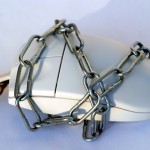Small commercial property businesses who run e-commerce websites, to offer customers a more flexible way of buying products, are more at risk of hackers than large corporations.

A recent study conducted by Symantec, an internet security firm, found that 40 per cent of all cyber attacks had been focused on small businesses, while only 28 per cent had been aimed at larger companies.
Speaking of the results, Ross Walker, Director of small business at Symantec, stated: “Hackers are going after ‘low hanging fruits’, these are the companies who are less security aware and do not have the proper defences in place.
“Hackers are increasingly targeting smaller, softer, less reactive targets since these provide a lower-risk alternative to financial institutions.”
Although the business is small, they will still have ample amounts of data that criminals can both use and sell on, such as credit card numbers and login details. Small firms are an easy target for criminals in the cyber world, as it is more than likely they will only have a large budget for a strong security system, and also will not have any policies in practice to prevent being hacked.
But the staff the small commercial property businesses hire could also lead to a breach in security, as Piers Wilson, from the information security team at PricewaterhouseCooper (PWC), describes: “People are the weakest link at any level of security.
“You can attack a business from anywhere – even through the mail room. For example, you can send them marketing material – perhaps with a CD attached that they put into their computer and then you’re in.
“You can make an enquiry of their accountancy department and as soon as you’ve got a name and email address you can send an email with an attachment, which they open because they recognise you. Often you even say thank you for their help in the email.”
To ensure that commercial properties protect their data online, they first need to understand what is classed as valuable data and where it is stored; then, they need to start protecting the said data.
According to Ascentor, a risk management specialist, around 80 per cent of cyber attacks could be prevented just by simply having strong passwords containing both numbers and letters, changing passwords regularly and not leaving them lying around for all to see. 
To protect the data, commercial properties should install anti-virus software and restrict user privileges, so that only people who actually need to see the data can access it. The company could also encrypt the data, which involves translating the data into an unrecognisable code, which can only be decrypted with a security key and a password.
These security measures will not guarantee that your commercial property website will not become a victim of a cyber attack, but they will make it more difficult for a criminal to extract your data.